- Home
- Deepak Chopra
Muhammad: A Story of the Last Prophet Page 12
Muhammad: A Story of the Last Prophet Read online
Page 12
Then as quickly as we lost him, my father became himself again. Like a patient whose fever has broken, he mastered his crisis. I don’t know how he did it. Yet one day I found him sitting alone on the floor of the pantry eating one flatbread after another between gobbets of lamb and beakers of well water. When he saw me, he burst out laughing.
“Forgive me, Ruqayah, you shouldn’t see your father with a greasy chin and bits of food hanging from his beard. But I am famished!”
“Your chin? Papa, you should see yourself. Your whole face looks like Fatimah’s when she’s gotten loose in the butter.” I laughed with him, even as tears blurred my eyes.
He stuffed himself, and then he slept. By nightfall he called his wife and us daughters into his presence. He smelled freshly bathed, with a touch of rose oil in his hair. His beard was no longer an unruly weed patch, and his eyes gleamed, even though they seemed far away.
“My dear,” he began, addressing us as one beloved person, “a great thing has occurred. My soul has wrestled with the possibility of madness. I teetered between destruction and greatness. But by God, the matter is resolved.”
None of us expected this. His distraction had turned to joy. He seemed as exultant as a bridegroom.
“Zaynab, quit looking at your sisters like that. I wasn’t mad before, and I am not mad now!”
“Then what are you, sir? Explain it to us simply, so we can understand.” Being the eldest—and somewhat spoiled—Zaynab could speak like that, on the verge of insolence.
My father saw that her motive was anxiety. “I want you to celebrate with me, my dear. This is a victory of the soul. I have been touched to the quick by Allah. “
My father caught himself a second time. He could see from our anxious faces that he must compose himself. Once he had, he continued in a calm voice.
“I have enjoyed the fruits of a good life, and another man would have been satisfied. You poor girls have been cursed with a father who cannot close his mind. Ordinary men think it their solemn duty to never open their minds. But I cannot speak for them. All I know is that despite the comforts and love within this house, I have been restless and discontented.”
My father spoke without accusation in his voice, but he sensed our disquiet.
“I am not putting even the slightest bit of blame on you. I should ask your forgiveness.”
He would have reached out for us, but my mother spoke up. “If you want to calm our fears, do as Zaynab asked. Explain in terms we can understand.”
My father bowed his head almost meekly. “I have been leading a secret life. Inside the walls of Mecca, I have played the part of a man who must be like other men. When I walk into the hills, Mecca vanishes like a fever dream. Behind my back those in the clan shake their heads and pity this poor, deluded seeker. They believe in no God and trust none of the gods they do believe in. My secret is that God is not someone you can seek. He is in all things, and always has been. He created this earth and then disappeared into it, like an ocean disappearing into a drop of water. I saw much in my cave, but this mystery was the most important.”
Zaynab interrupted him. “Simpler, Papa,” she pleaded.
My father sighed. “An angel came to me. He told me that I was God’s chosen one.”
I will always wonder if Zaynab was ready to shriek or burst into wild laughter. We will never know, because my mother shot her a look like daggers. With all the effort she could summon, her face growing red, Zaynab stayed silent.
“Are angels real?” my mother asked quietly. We all knew, although we never spoke of it, that my father had been talking to wanderers, some of them Jews, others Christians. To an Arab, angels were fantastic, all but unknown.
“Very real,” my father said quietly. You could see that he was treading lightly inside, like a man who may be walking on quicksand. “In the middle of the night one came to me in all his radiance. I was wrapped in a blanket on the cold floor of the cave. I shivered when the angel called to me, and at first I didn’t know that my trembling was awe, not the cold. I saw a figure arrayed in light standing before me. His voice was commanding, like a soldier who could not be disobeyed, but it was also so gentle that it all but broke my heart. ‘Recite!’ he ordered.”
My father looked around at our little group. We were hanging on every word. “You know, my dear, that he was asking the impossible.”
It was true. My father never recites verses or sings songs. It has been a sore point with him since he was a boy with the Bedouin, almost a humiliation. He was only a listener, never a speaker, and listeners win no glory.
“I told the angel I could not recite. You see, even though I was in awe, my mind kept working. I realized that this had to be a dream or a trick of the demons. A notion came into my head that if I talked reasonably to this ghost or jinn, a way of escape would show itself. The angel grew in size and brilliance. Twice as forcefully he ordered, ‘Recite!’ Before I could respond, he threw his arms around my chest and embraced me, to prove that he was no apparition. I cried out, thinking that I would faint—his arms wound around my chest like iron bands. Three times I tried to resist, and three times he seized me in his arms.”
You will well believe that my father couldn’t remain composed while telling us about the angel. His agitation was strong, and Fatimah began to cry. My mother sent her away with a nurse before Fatimah could plead again, “Where is my papa? I want him back.” We heard her wailing die away as the nurse, enfolding Fatimah in her skirts, rushed to the far corner of the house.
“Was that your victory of the soul?” asked Zaynab, who seemed determined to let her doubts speak for her.
“Not yet. I was still too troubled to think,” said my father. “When the angel finally released me from his grasp, I dashed out of the cave. My deepest wish was to rid myself of this horrifying burden. To be God’s messenger belonged to any other man in the world but me. My heart pounded, and my only thought was to throw myself off the mountain. I beg your forgiveness. In my distraction I failed to think of my family, and the fate that awaited you all if I died. At the summit of Mount Hira I stood on legs as weak as a kitten’s, staring down at the rocks below. The angel hadn’t followed me out of the cave. That much was a relief. It gave me a few seconds to breathe. Then I looked at the sky, and he was there. The angel towered over me as high as thunderclouds piled up to heaven. I turned around, and he was there behind me, and to every side. I knew at that moment that the form of the angel I saw in the cave was infinitely smaller than his presence. It was an image suited to human sight. The real angel, who came from Allah, lives in Allah. He must be infinite if he is real.”
“What do you call this one who came to you?” asked my mother soberly.
“Gabriel. He told me to call him that,” my father said.
Now I spoke up. “You haven’t told us if you obeyed him. Did you recite?”
My father’s eyes gleamed. “That’s the miracle, my dear. A humble man whose tongue has no more eloquence than shoe leather suddenly spoke.”
My father closed his eyes and held forth:
Recite! In the name of your Lord,
who created human life from congealed drops of blood.
Recite, for your Lord is ever bountiful,
he who teaches by the pen,
who taught mankind what was not known before.
As he spoke, my father was transformed. His face glowed; he seemed transported to Paradise. And the verse. I can’t explain to strangers how beautifully it fell on the ear, like liquid song. Such precious words couldn’t have been his. Where did they come from?
Zaynab broke the spell by suddenly fleeing the room. I looked at my other sister, Umm Kulthum, who had been playing absent-mindedly with her braided hair, the way an infant might pet a doll. “How beautiful,” she murmured.
The moment was over. My mother ran down the corridor calling for Zaynab. My father came back to his usual self with a small cough and asked Umm Kulthum if she was all right. A servant ran in to announce
that Abu Bakr was at the door.
“Tell him I’m just coming,” said my father, adjusting his robe and looking around for his slippers. He wouldn’t greet a respected friend in his bare feet.
As he was leaving the room, I grabbed his arm. “Tell me, Papa, what has really happened to you?”
“There is an inner man that nobody sees,” he replied. “Now he is on the outside, and the outer man, who is seen by everyone, he is gone forever.”
11
ABU BAKR, MERCHANT OF MECCA
We were only a handful at first. I can’t describe how strange we felt, being set apart from society. It wasn’t like having the plague. Just the opposite. Imagine that you are starving, driven out of your home to wander the wasteland. In every direction there is only emptiness, and the voice of fear whispers, “Life is nothing but this.”
Then one day God spreads a banquet in the desert. Succulent viands, deeply tinted wine, the richest sweetmeats. At first you can’t believe your eyes, but soon you have gorged yourself, and lo, a second miracle. No matter how much you eat, the feast renews itself. The table groans with God’s bounty.
That was us, starving souls who were fed by Muhammad’s words.
“Don’t make sheep’s eyes at me,” he would say. “I am not your shepherd. The only shepherd is Allah. I am just a man among men.”
I had known him for thirty years, man and boy, but his humble attitude still amazed me. Wouldn’t you want to be worshiped? Anyone who answers no is either lying or has given up on life. Muhammad had done neither. He knew that he didn’t cook the feast or make it appear in the desert. He was simply the host who beckoned more guests to come and be filled.
You would have been filled too, sitting at his feet when God delivered a new message. First there was the moment of contact, which was always the same greeting:
In the name of the Lord, who is merciful and compassionate.
We’d never know what would come next. Muhammad himself never knew. God is a master of surprise.
Do you not see how he has lengthened the shadows?
The One is He who made the night a garment for you.
He gave you sleep so that you may rest,
and the morning sky to be a resurrection.
Who had ever seen the night as a garment and the morning as a resurrection? I marveled that God could combine beauty and a promise. It was magical.
I squandered my good name by standing up in the inns, before anyone was drunk yet, and reciting a sura, a passage like that. I felt compelled the way ordinary men are compelled to argue, fight, belch, and make love. With a fresh sura in mind, having run from Muhammad’s house, I’d recite things no one could fathom:
He has prepared a bonfire for those who reject the hour that is to come.
They will cry out for death,
and He will say, “Do not cry out this day for one death, but for many.”
Idlers and sots lounging around the wine casks would stare at each other in bewilderment. Why was I ruining their drinking hour with talk of death? Or this:
On the day that the sky is split open and the angels stream down in hosts,
true authority will belong to the Lord of Mercy.
On that day the unbelievers will tremble.
Apocalypse is a bad appetizer. But the men couldn’t be deaf when it was me, Abu Bakr, who uttered such warnings. I wasn’t a crazed half-wit. I had bested most of them in trades and reaped gain from their loss. Muhammad was delighted that I made a spectacle of myself.
“When you stand on a table to speak, they see you standing on a pile of gold,” he said. “You’re halfway to God already.”
Those same men would have scorned my real motive. I wasn’t about to gorge myself alone; I had to share the sustenance from heaven. Imagine my sickness of heart when so many people turned away—everyone, if you want the truth. They despised Muhammad’s message without even hearing it, like someone who turns his back on a feast because a rumor has spread that the food is poisoned.
It wasn’t even a question of believing. Arabs are a murderous race, so our enemies say. If so, we must be murdering in our sleep, because few in Mecca wanted to wake up even when God shook them.
They didn’t turn on Muhammad all at once. That’s the best I can say. Suspicion spread slowly, like smoke seeping through cracks in a wall. The authorities went on guard first. The Qurayshi elders fixed Muhammad in their steely gaze like hyenas waiting to see if a wounded lion would fight or fall. He didn’t do either. One day his gate swung open, and Muhammad walked out, strolling to the marketplace as if nothing had happened.
Muhammad’s uncle, old Abu Talib, breathed a sigh of relief. His nephew was respectable again. “If you want the gods to protect you, be harmless,” Abu Talib said cynically. “If Muhammad had the slightest power, they would strip it away. At least now he can live as strangely as he wants, so long as he keeps quiet.” Abu Talib never lost the bitter taste of his own downfall.
I sat at the foot of the old man’s bed and nodded. Abu Talib was right about power. We have a saying: “If power can be bought, sell your mother to get some. You can always buy her back.”
Abu Talib was wrong on another point, though. I was sent to tell him the bad news.
“Muhammad will keep quiet in public, but not behind walls. He’s the messenger of God. In his mind, everything has changed. He can never go back.”
Abu Talib sat up, his face turning red. “In his mind? In my mind I may be the emperor of Abyssinia. So what?” His rheumy eyes narrowed. “What about you? What do you think of this madness?”
“I think we should wait and see,” I said.
Abu Talib threw himself back on his pillow. “We’re lost!”
The old man loved his nephew. Abu Talib never forgot the promise made to Abdullah’s soul, that his son would always find shelter under his roof. Abu Talib knew it would be catastrophic to rock the boat. The Quraysh had nailed down every corner of the city. They had the rats marching in straight lines, people said in private. But Allah can turn a world upside down at His whim. What does Allah care about fat Qurayshi merchants and their padded asses?
I took my leave by telling Abu Talib to get some rest.
He gave another smile, more nervous than cynical this time. “Will you carry a message to the prophet? It’s not from God, but it is important. Tell my nephew not to visit my house unless I summon him. I want to die in my sleep.” Abu Talib moaned softly, pulling on his wispy beard. “Poor, foolish soul. Tell him I have turned my face to the wall. I don’t care if Allah opened his eyes. That’s his business. But if he tries to open ours, there will only be trouble.”
I brought word back to Muhammad. He took the news calmly. Who was pledged to believe him, anyway? The nearest blood—his wife and daughters; little Zayd, who knew no better, but was devoted to his foster father. And I, who shared no blood with any of them. As long as he held on, Abu Talib was still head of the Hashim clan. Yet with each passing year he continued to spend too many days in bed and lose too much money. He spoke for no one but himself now.
I was surprised how closely Allah watched our movements down here. He had his ear to local gossip, because one day this message came through:
The doubters will say, “How can this be God’s messenger?
He walks through the marketplace like any other man.”
Tell them, all my messengers have walked through the marketplace like other men.
Before the angel appeared, Muhammad had the town’s goodwill. Unfortunately goodwill is like a rose in the desert. Unless you tend it lovingly, it withers overnight. Naturally everyone was glad to see Muhammad back on his feet and among the living. Until he spoke, that is. A man who had cultivated tact suddenly had the unruly tongue of a child. I once took another merchant with me to see Muhammad soon after the great change came upon him. This man was wary, and I wanted the word to go out that Al-Amin was the same trusted man he had always been.
Zayd greeted us at the gate. He was squat
ting on the ground stringing together a kite. The boy was used to me, but he grew shy seeing a stranger. I complimented him on his kite, which would fly like a bird.
“Not any bird. A falcon,” said Zayd gravely. “It will pluck the eyes out of anyone who hurts my father.”
The merchant I had brought gave a small, twisted smile, and I hurried him inside. Muhammad was sitting in the back of the house. During that time, I should say, he might get a new message from God at any minute, day or night. No one knew this outside the family. I only risked bringing a stranger, because I knew the signs when Allah spoke to Muhammad. His whole being would change, like a lantern that suddenly has its cover snatched off. If I saw that happening, I could spot a wasp or smell something burning, any pretext to rush the visitor out of the room.
Muhammad beckoned us to sit. We didn’t chat, not at first. Whatever you may hear about him from friends or enemies, Muhammad always bore himself with a quiet dignity. This too had been changed by the angel. Now he wasn’t simply quiet, he created a silence around him that filled the room like a heavy perfume.
Clumsily, I started up some small talk about business. The visitor felt on safe ground now. He related a tale about a sandstorm that struck his last caravan. It rolled over the camel train like a towering brown wave on the ocean. And when they were no longer blinded, his men found that two camels had wandered away. Even though his men searched for hours, they were never found,
“They swear that the storm blew them into the clouds. And I believe them,” said the visitor with a tight laugh. “I had them tortured in a cellar for a few days, and they never broke.” He threw his hands in the air. “My loss. You must know how it feels.” Muhammad, like any other merchant, had suffered such misfortunes.
Muhammad gave the man a look. I confess, inside I silently pleaded, Don’t talk about God. You need allies.
In a sober voice Muhammad said, “If you trusted in Allah as you should, He would sustain you in all things. In God there can be no loss.”

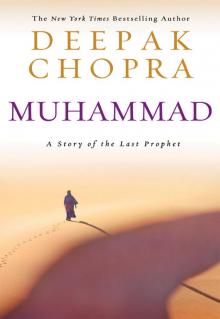 Muhammad: A Story of the Last Prophet
Muhammad: A Story of the Last Prophet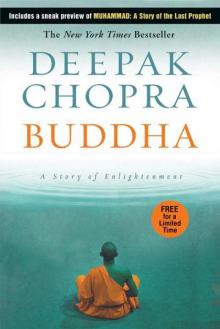 Buddha
Buddha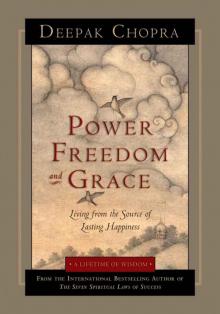 Power, Freedom, and Grace
Power, Freedom, and Grace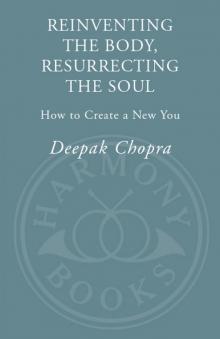 Reinventing the Body, Resurrecting the Soul: How to Create a New You
Reinventing the Body, Resurrecting the Soul: How to Create a New You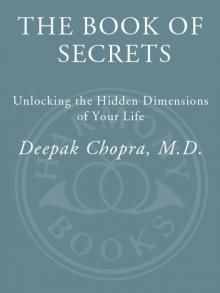 The Book of Secrets: Unlocking the Hidden Dimensions of Your Life
The Book of Secrets: Unlocking the Hidden Dimensions of Your Life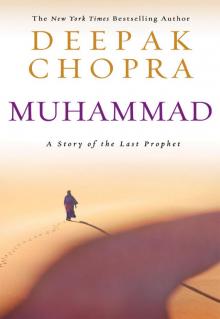 Muhammad
Muhammad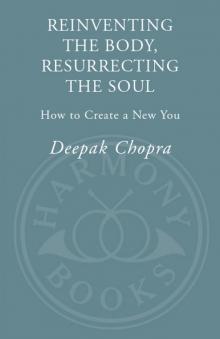 Reinventing the Body, Resurrecting the Soul
Reinventing the Body, Resurrecting the Soul